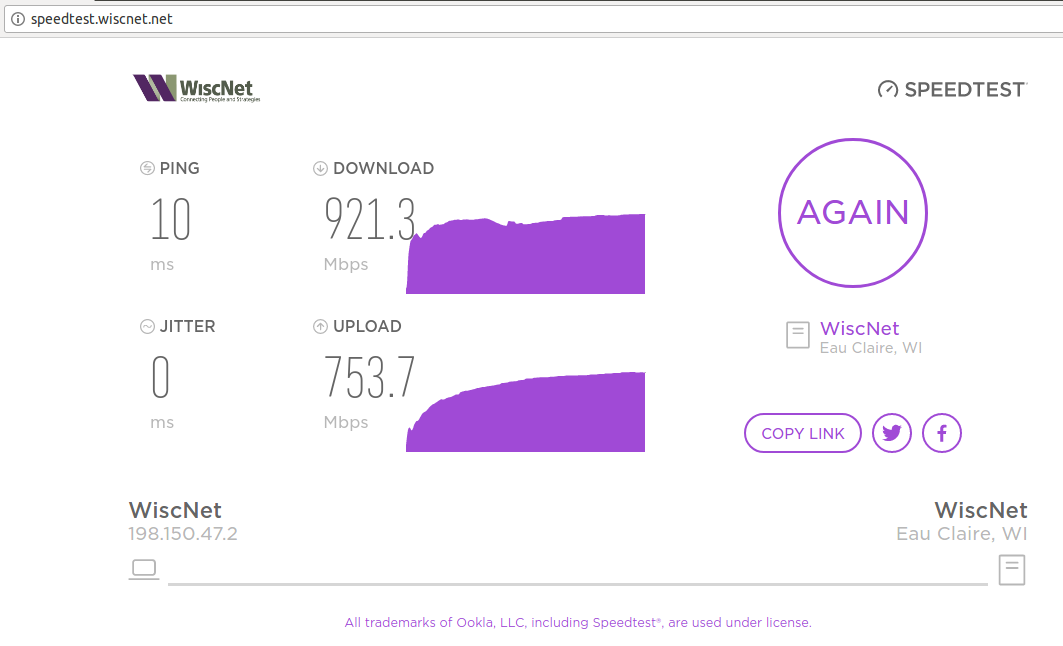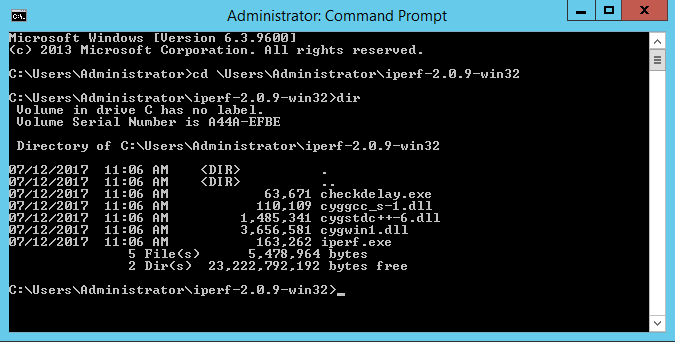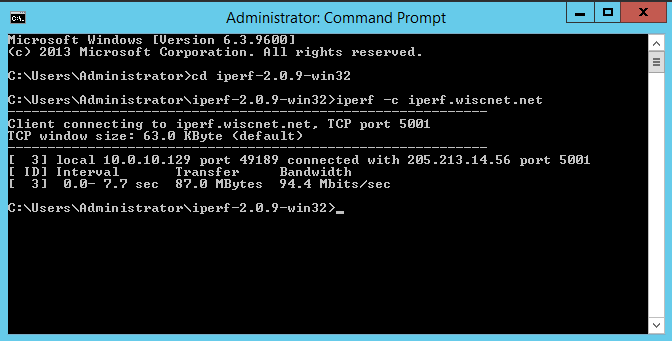WiscNet hosted speedtest.net
- For a quick and easy testing, you may use to use WiscNet's HTML based browser test:
WiscNet hosted Iperf
- Iperf is a commonly used network testing tool to help measure network throughput.
- Iperf is an open source tool. There are clients for Windows, Mac, Linux, Bsd, etc.
- Iperf operates where one end is the client, the other is the server. WiscNet runs an Iperf version 2 server in Eau Claire, WI.
- The server is restricted to WiscNet IP addresses.
- Iperf2 and iperf3 are incompatible
- iperf.wiscnet.net runs a TCP Iperf server on the default port (5001)
- iperf.wiscnet.net runs a UDP Iperf server on port 5002
- iperf.ipv6.wiscnet.net runs a v6 TCP Iperf server on port 5003
- iperf.ipv6.wiscnet.net runs a v6 UDP Iperf server on port 5004
Some common Iperf flags
Enter iperf -h or man iperf depending on your operating system. Here are some common flags:
| Flag | Details | Example |
|---|---|---|
| -c | Client mode | -c |
| -t | Time to run the test in seconds | -t 30 |
| -P | Number of parallel connections | -P 2 |
| -u | UDP (default is TCP) | -u |
| -b | Bandwidth per thread | -b 250m |
| -i | Interval between bandwidth reports in seconds | -i 1 |
-L | Listen on port | -L 6001 |
-r | bidirectional test (individually) | -r |
-d | bidirectional test (simultaneously) | -d |
Examples
Unidirectional 1Gbps circuit test
Command
iperf -c iperf.wiscnet.net -t 10 -P 4 -u -b 250m -i1
Results
When runing multiple threads you must look at the SUM lines for total throughput. Output below shows successfully getting 953Mbits/sec through
Bidirectional 1Gbps circuit test
Check your firewall settings and NAT to ensure port 6001 is open to your host
iperf -c iperf.wiscnet.net -t 10 -P 4 -u -b 250m -i1 -r -L 6001
TCP vs UDP testing
Iperf uses TCP by default. TCP has built in congestion avoidance. If TCP detects any packet loss, it assumes that the link capacity has been reached, and it slows down. This works very well, unless there is packet loss caused by something other than congestion. If there is packet loss due to errors, TCP will back off even if there is plenty of capacity. iperf allows TCP to send as fast as it can, which generally works to fill a clean, low latency link with packets. If a path is not clean/error free or has high latency, TCP will have a difficult time filling it. For testing higher capacity links and for links with higher latency, you will want to adjust the window size (-w option). See the KB article on TCP performance for more background.
By using the -u option, you have told iperf to use UDP packets, rather than TCP. UDP has no built in congestion avoidance, and iperf doesn't implement it either. When doing a UDP test, iperf requires that the bandwidth of the test be specified. If it isn't, it defaults to 1Mb/s. You can use the -b option to specify bandwidth to test. iperf will then send packets at the request rate for the requested period of time. The other end measures how many packets are received vs how many were sent and reports its results.
Installation Guides
Microsoft Windows
- Download and extract iperf2: iperf-2.0.9-win32.zip
- Right-click the downloaded iperf-2.0.9-win32.zip file and extract the contents of the .zip to any folder (seen here under \Users\Administrator)
- Open a command prompt and navigate to the extracted iperf2 folder:
cd \Users\Administrator\iperf-2.0.9-win32 dir
- Now you can run your desired iperf test:
Apple macOS
- Download and extract iperf-2.0.5-macos-x86_64.zip to any folder
- Open a terminal
- cd to your extracted iperf folder
iMac:~ $ cd Downloads/iperf-2.0.5-macos-x86_64 iMac:iperf-2.0.5-macos-x86_64 $ ls -lh total 176 -rw-r--r-- 1 staff 693B Feb 20 2011 README drwxr-xr-x@ 8 staff 272B Feb 20 2011 doc -rwxr-xr-x@ 1 staff 78K Feb 20 2011 iperf -rw-r--r--@ 1 staff 3.7K Feb 20 2011 iperf.1
- Now you can run your desired iperf test:
iMac:iperf-2.0.5-macos-x86_64 $ ./iperf -c iperf.wiscnet.net ------------------------------------------------------------ Client connecting to iperf.wiscnet.net, TCP port 5001 TCP window size: 128 KByte (default) ------------------------------------------------------------ [ 5] local 10.0.10.100 port 51961 connected with 205.213.14.56 port 5001 [ ID] Interval Transfer Bandwidth [ 5] 0.0-10.0 sec 184 MBytes 154 Mbits/sec iMac:iperf-2.0.5-macos-x86_64 $
*nix
- Many Lunix and Unix distros will have iperf in official repositories. Make sure to install iperf2 (iperf), not iperf3
Ubuntu
$ apt-cache search iperf | grep -i iperf iperf - Internet Protocol bandwidth measuring tool iperf3 - Internet Protocol bandwidth measuring tool $ sudo apt-get install iperf



